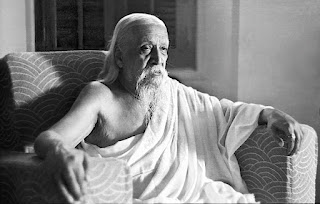Sri Aurobindo, an Indian nationalist, and spiritual guru, passed away.
5 December 1950: Sri Aurobindo, an Indian nationalist, and spiritual guru, passed away.
An Indian nationalist, spiritual leader, and philosopher, Sri Aurobindo Ghose was born in Calcutta on August 15, 1872, to Krishna Dhan, a senior medical officer, and Swarnalata Devi, who came from a Brahmo family. When he was around five years old, Sri Aurobindo along with his two brothers was sent to Darjeeling's Loreto Convent School.
In 1879, the three brothers were sent to England where they got a secular education under the care of an Anglican Priest W.H. Drewett and his wife. Sri Aurobindo, who was studied Latin, French, Greek, and English poetry got admission at King's College, Cambridge, and, following his father's wishes, cleared the written test of the Indian Civil Service. But he was not interested in actually joining the service. He later sailed back to India to work with the Baroda State Service. Sri Aurobindo's father received the false information that his son's ship had sunk near Portugal. Unable to bear the shock, he died.
Around this time, his interest in Indian nationalism started growing and he got in touch with other nationalist leaders such as Lokmanya Tilak. Sri Aurobindo was particularly active in Bengal, which was then the epicenter of the nationalist movement, and supported groups resisting British rule. In 1901, he married Mrinalini, the daughter of a government official, who was only 14 years old at the time.
Along with leaders such as Bal Gangadhar Tilak and Bipin Chandra Pal, Sri Aurobindo came to be identified as a hardline nationalist. In 1960, Sri Aurobindo became the chief editor at Bande Mataram, a nationalist publication started by Bipin Chandra Pal, Speaking about Aurobindo's role in the journal, Pal said. "Morning after morning, not only Calcutta but the educated community almost every part of the country eagerly awaited its [Bande Mataram's] vigorous pronouncements on the stirring questions of the day... It was a force in the country which non dared to ignore, however much they might fear or hate it, Aravinda[Aurobindo] was the leading spirit, the central figure, in the new journal".
In 1914, Sri Aurobindo started a journal called Arya, devoted to spiritual and philosophical matters. In the same year, Mirra Richard, a young french woman who was a seeker of spiritual truth, arrived in Pondicherry. In Sri Aurobindo, Mirra, who came to be known as the 'Mother', found the ideal spiritual companion and teacher.
With the number of followers of Sri Aurobindo growing, the Sri Aurobindo Ashram was set up in 1962 by the Mother. Between 1926 and 1950 he lived in near-total silence.
When India attained independence, Sri Aurobindo's message to the nation was. "August 15th, 1947 is the birthday of free India. It marks for her the end of an old era, the beginning of a new age. But we can also make it by our life and acts as a free nation an important date in a new age opening for the whole world, for the political, social, cultural and spiritual future of humanity."
Sri Aurobindo died on December 5, 1950. The mother who gave shape to the Sri Aurobindo Ashram and continued to take his teachings forward, died on November 17, 1973. She once remarked: "....my only aim in life is to give a concrete form to Sri Aurobindo's great teaching and in his teaching, he reveals that all the nations are essentially one and meant to express the divine unity upon earth through an organized and harmonious diversity,"






Comments
Post a Comment